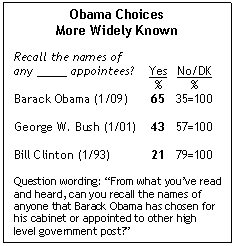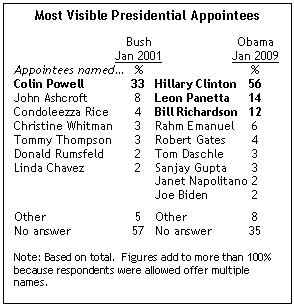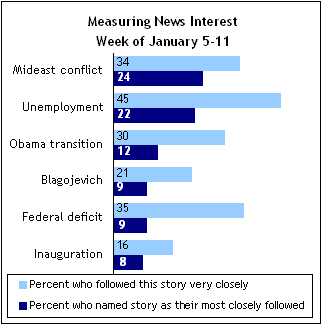Summary of Findings
 Public awareness of Barack Obama’s choices for cabinet and other high level posts is substantially higher than awareness of the top picks by George W. Bush and Bill Clinton just before they were first inaugurated. About two-thirds of Americans (65%) can name at least one person that Obama has chosen for a high level post in his administration. In January 2001, fewer than half (43%) could identify a Bush appointee. In January 1993, even fewer (21%) could name someone joining Clinton’s new administration.
Public awareness of Barack Obama’s choices for cabinet and other high level posts is substantially higher than awareness of the top picks by George W. Bush and Bill Clinton just before they were first inaugurated. About two-thirds of Americans (65%) can name at least one person that Obama has chosen for a high level post in his administration. In January 2001, fewer than half (43%) could identify a Bush appointee. In January 1993, even fewer (21%) could name someone joining Clinton’s new administration.
While the public is paying close attention to news about Obama’s senior appointments, there was far more public interest last week in news about rising unemployment numbers than in reports on Obama’s transition. More than four-in-ten (45%) tracked news about the rising unemployment rate very closely, compared with 30% who followed news about Obama’s transition very closely.
 To be sure, much of the increased awareness of Obama’s high-level personnel selections has to do with the president-elect’s selection of Hillary Clinton to serve as secretary of state. Fully 56% of respondents offered Clinton’s name as one of Obama’s top appointments. Yet 35% were able to name a nominee other than Clinton, including 14% who recalled the name of Leon Panetta, Obama’s choice to be director of the Central Intelligence Agency, and 12% who could name Bill Richardson, the New Mexico governor who withdrew his nomination to be commerce secretary on Jan. 4 because of an investigation into the awarding of contracts in his state. (Respondents were permitted to offer the name of more than one appointee.)
To be sure, much of the increased awareness of Obama’s high-level personnel selections has to do with the president-elect’s selection of Hillary Clinton to serve as secretary of state. Fully 56% of respondents offered Clinton’s name as one of Obama’s top appointments. Yet 35% were able to name a nominee other than Clinton, including 14% who recalled the name of Leon Panetta, Obama’s choice to be director of the Central Intelligence Agency, and 12% who could name Bill Richardson, the New Mexico governor who withdrew his nomination to be commerce secretary on Jan. 4 because of an investigation into the awarding of contracts in his state. (Respondents were permitted to offer the name of more than one appointee.)
In January 2001, the name most mentioned as Bush prepared for his inauguration was Colin Powell, the decorated military leader and former national security advisor whom Bush had tapped to be his secretary of state. A third of Americans (33%) offered Powell’s name. Just 19% could name any of Bush’s other appointees. Among the most frequently mentioned were John Ashcroft (8%), Bush’s first attorney general, and Condoleezza Rice (4%), his first national security advisor. As Clinton took office, the name offered most often by the public was Lloyd Bentsen (8%), the former Texas senator whom Clinton had chosen to be his treasury secretary.
Two Prominent Nominees
Both the Panetta and Richardson nominations generated significant recent media attention, Richardson for his quick withdrawal just after New Year’s Day and Panetta because of questions – raised by Democrats as well as Republicans – about his credentials to take control of the nation’s intelligence operations.
Last week, Panetta, a former congressman and Clinton White House chief-of-staff, was the third-ranking newsmaker according to an analysis of media coverage by the Pew Research Center’s Project for Excellence in Journalism. Obama was the week’s top newsmaker, followed by Roland Burris, who is Illinois Gov. Rod Blagojevich’s choice to replace Obama in the U.S. Senate. The previous week, Richardson was the sixth ranking newsmaker, tied with Al Franken, the Minnesota Democrat and Senate candidate.
The Pew Research Center’s weekly News Interest Index survey, conducted Jan. 9-12, found no partisan differences among those who could identify Obama appointments. About two-thirds of Republicans (67%), Democrats (66%) and independents (65%) could identify at least one. In 2001, Republicans proved more knowledgeable than Democrats about Bush’s team. A majority of Republicans (52%), compared with about four-in-ten independents (42%) and Democrats (40%), could recall at least one person appointed by Bush.
Meanwhile, the public’s interest in news about Obama’s appointments and plans for his administration is similar to interest at the start of the Clinton administration and greater than at the start of the Bush administration. Two-thirds (67%) say they followed news about the transition very closely (30%) or fairly closely (37%) last week. At the same point in 2001, 58% said they followed news about the Bush transition very closely (26%) or fairly closely (32%). At the start of Clinton’s first term, 66% said they followed his appointments very closely (24%) or fairly closely (42%).
Troubling Economic Numbers and Gaza Attract Most Attention
 The public remained focused on bad economic news last week, particularly reports of increasing unemployment and significant job losses for 2008 as well as record high federal budget deficit projections for 2009. News about rising unemployment (the rate is at a 16-year high) attracted the very close attention of 45% of the public. Another 34% say they followed this news fairly closely.
The public remained focused on bad economic news last week, particularly reports of increasing unemployment and significant job losses for 2008 as well as record high federal budget deficit projections for 2009. News about rising unemployment (the rate is at a 16-year high) attracted the very close attention of 45% of the public. Another 34% say they followed this news fairly closely.
More than a third of the public (35%) says they followed news about the latest federal deficit projections very closely and another 30% reported following this news fairly closely. Interest in these economic stories cuts across income groups. Roughly equal proportions of high, middle and low income Americans reported following these two stories very closely.
Rising unemployment was the single news story followed more closely than any other for 22% of Americans. That placed it among the top two stories of the week in terms of public interest. The other top story, the ongoing conflict in the Gaza Strip, was listed by 24% as the top story of the week. About a third (34%) followed news involving the Israeli-Hamas fighting in Gaza very closely last week, up slightly from 28% the previous week.
Reports about the impeachment of Illinois Gov. Rod Blagojevich over allegations he attempted to sell the state’s vacant U.S. Senate seat for personal gain drew the very close attention of 21% of the public. About one-in-ten (9%) listed this as their most closely followed news story of the week.
Meanwhile, news about preparations for Obama’s inauguration on Jan. 20 was followed very closely by 16% of Americans. Fewer than one-in-ten (8%) say this was the news they followed most closely last week.
These findings are based on the most recent installment of the weekly News Interest Index, an ongoing project of the Pew Research Center for the People & the Press. The index, building on the Center’s longstanding research into public attentiveness to major news stories, examines news interest as it relates to the news media’s coverage. The weekly survey is conducted in conjunction with The Project for Excellence in Journalism’s News Coverage Index, which monitors the news reported by major newspaper, television, radio and online news outlets on an ongoing basis. In the most recent week, data relating to news coverage were collected from January 5-11, 2009 and survey data measuring public interest in the top news stories of the week were collected January 9-12, 2009 from a nationally representative sample of 1,004 adults.
About the News Interest Index
The News Interest Index is a weekly survey conducted by the Pew Research Center for the People & the Press aimed at gauging the public’s interest in and reaction to major news events.
This project has been undertaken in conjunction with the Project for Excellence in Journalism’s News Coverage Index, an ongoing content analysis of the news. The News Coverage Index catalogues the news from top news organizations across five major sectors of the media: newspapers, network television, cable television, radio and the internet. Each week (from Sunday through Friday) PEJ compiles this data to identify the top stories for the week. The News Interest Index survey collects data from Friday through Monday to gauge public interest in the most covered stories of the week.
Results for the weekly surveys are based on telephone interviews among a nationwide sample of approximately 1,000 adults, 18 years of age or older, conducted under the direction of ORC (Opinion Research Corporation). For results based on the total sample, one can say with 95% confidence that the error attributable to sampling is plus or minus 3.5 percentage points.
In addition to sampling error, one should bear in mind that question wording and practical difficulties in conducting surveys can introduce error or bias into the findings of opinion polls, and that results based on subgroups will have larger margins of error.
For more information about the Project for Excellence in Journalism’s News Coverage Index, go to www.pewresearch.org/journalism.


